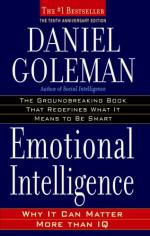|
This section contains 390 words (approx. 1 page at 400 words per page) |

|
Part Three: Chapter 11, Mind and Medicine Summary and Analysis
In the doctor patient relationship, the doctor is trained to treat disease and injury but not the emotional needs of the patient. The patient experiences the disease or injury with an emotional component. Psychologist Robert Ader discovered that the immune system is not separate from the brain, but connected to it through the part of the brain that regulates emotion. This radical finding led to more studies on the effect of emotions on health. These studies show a broad statistical link between chronic negative emotions (anxiety, sadness, hostility) doubled the risk of disease, such as asthma, ulcers and heart disease.
Anger, a Stanford University Medical School study found, is the emotion that does the most damage to the heart. Dr. Redford Williams, at Duke University, found that "being prone to anger...
(read more from the Part Three: Chapter 11, Mind and Medicine Summary)
|
This section contains 390 words (approx. 1 page at 400 words per page) |

|




